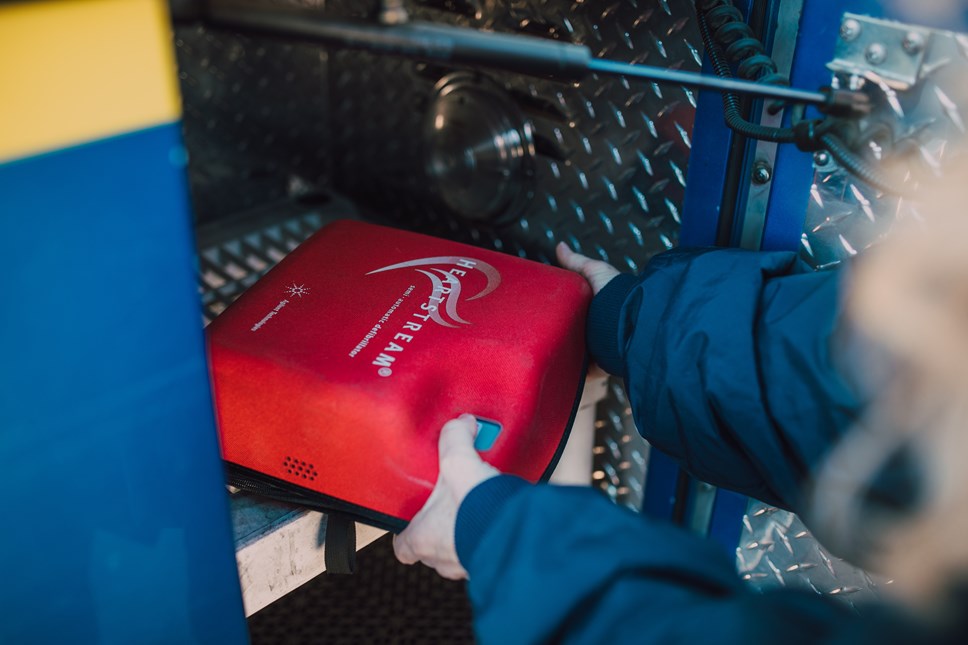
New funding to increase defibrillator access in Wales
Cyllid newydd i gynyddu mynediad at ddiffibrilwyr yng Nghymru
Health Minister Eluned Morgan has announced a further £500k to improve community access to defibrillators.
Increasing the availability of defibrillators in community settings will help to improve the survival rates of people who suffer a cardiac arrest outside of a hospital.
The funding will enable community groups, sports grounds and public organisations to access a defibrillator and is a further boost to the £500k announced in September last year.
The previous funding saw more than 400 applications for defibrillators approved, including from local and town councils, residents’ associations, gyms, schools, sporting venues, childcare venues and places of worship.
Each year in February, a month-long #Defibuary campaign takes place to raise awareness and equip people with the skills and confidence to save a life.
A person’s chance of surviving an out-of-hospital cardiac arrest decreases by an estimated 10% with every passing minute. Every year in Wales around 6,000 people suffer sudden cardiac arrest.
Save a Life Cymru, a Welsh Government-funded campaign, also helps to raise awareness, fund new educational and CPR training resources and improve public access to defibrillators.
There are currently 6,188 public access defibrillators registered with the Welsh Ambulance Services NHS Trust and the Circuit (the national defibrillator network).
Minister for Health, Eluned Morgan said: “I am pleased to announce a further £500k in funding, bringing our investment in community defibrillators to £1m in the last six months.
“I am committed to raising awareness of lifesaving skills and ensuring better community access to defibrillators across Wales.
“It’s important we have a comprehensive network of defibrillators, people are aware of that network and have the confidence to use them. The work of Save a Life Cymru will help support this.“Every second counts when someone suffers a cardiac arrest. We can all help raise awareness of the importance of early CPR and defibrillation.”
Notes to editors
- A case study of an application approved and shortly receiving a defibrillator is below. For further information please contact chris.seal@gov.wales
-
Neville Eden, 61, applied to Save a Life Cymru for a community defibrillator on behalf of the residential estate where he lives and set up a fundraising page to cover the cost of the defibrillator cabinet.
Within 12 hours of setting up the page the residents of Parc Hendre, in Abergele, raised more than £500.
The cabinet has now been installed on an electrical sub-station, after permission was granted by SP Energy Network, and the defibrillator is set to be installed next week.
Neville, who previously trained as a first aider with the Red Cross, said: “The idea came from a local Facebook group set up in lockdown and really brought everyone together. They’re all amazing for raising the money in such a short period of time.
“I’ve shared a few training videos in the group about how to use it, but I know the 999 operator would talk through it with anyone who needed to use it.
“We’re also hoping to organise a CPR and defibrillation skills session with a partner from Save a Life Cymru, so people feel confident to use it too.”
- 490 applications were submitted for defibrillators purchased from the first £0.5m announced for community defibrillators in September. Applications have varied from: local and town councils, residents’ and housing associations, gyms, schools, sporting venues, organisations, childcare venues and places of worship.
- So far, 433 applications have been approved. Nineteen applications were not approved as they did not meet the critieria.
- Each year in February, a month-long #Defibuary campaign takes place to raise awareness and equip people with the skills and confidence to save a life.
- Every year in Wales more than 6,000 people will have an out-of-hospital cardiac arrest and currently the survival rate is less than one in five. In Wales, 80% of cardiac arrests occur in the home.
- Anyone, at any age and at any time can suffer a cardiac arrest and knowing what to do and being familiar with a defibrillator can improve the chances of survival. It is a quick and easy skill to learn and you can find out more by visiting https://gov.wales/save-a-life-cymru
- Save a Life Cymru is a valuable partnership that brings together organisations across Wales to help develop the Welsh public’s CPR and defibrillation skills so people feel confident to help if they witness someone experiencing an out-of-hospital cardiac arrest.
